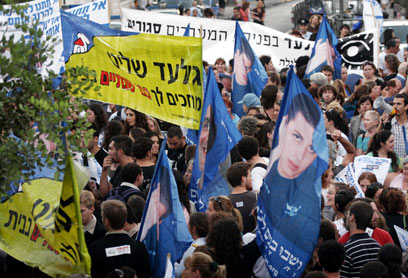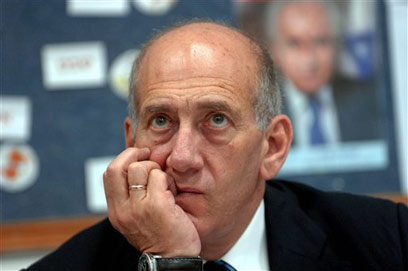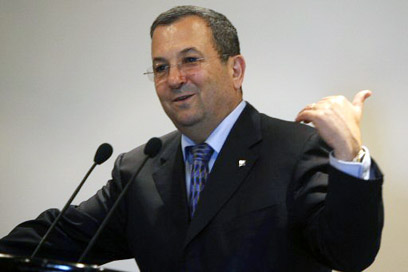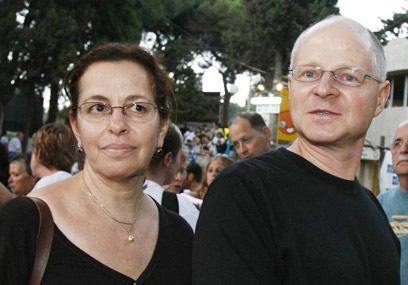
The hope-despair continuum
Gilad Shalit has been held by Hamas for two years. His parents, Aviva and Noam, have finally had enough. They want Prime Minister Olmert and his government to bring their son home, and they don’t care how they make it happen
"You can't really say that Gilad isn't here, you can feel him in every corner of the house, but he is so absent. I look at his pictures and I have no idea when he'll sit here, in this chair, again. It's driving me crazy." Aviva Shalit sits in her living room surrounded by photos of her captive son; and stickers reading "Don't let indifference kill them," shining in neon blue from every corner of the room.
Over the last few months, Gilad's room has turned into a pseudo warehouse, overrun with boxes filled with letters of support. She used to read them, but she just can't muster the strength to do that any more. "This has been a particularly hard months," she says.
June 25 marked the second anniversary of Gilad Shalit's captivity. The serene, intoxicating views of Mizpe Hila, the western Galilee community in which the Shalits reside, have been tainted with the living hell of dealing with his absence, with the daily anxiety and utter uncertainty as to his condition; and the never answered question of when she will see him again. The day Gilad was taken was the day a heartrending look crept into his mother's eyes.
"It's been two years and my Gilad still isn't back," she says. "It's infuriating and frustrating, mostly because there really isn't anything I can do and it driving me insane. I feel we're essentially running on empty." She stops, takes a breath, her hands turn into tight fists. She wants her son back, period. The rest she leaves up to Noam, Gilad's father.
"I've rediscovered him over the last two years. The two of us used to be so introverted, but he's taken charge since Gilad was taken. He's had to. We made the decision that I won't be in the center of things as he is. He's doing very well, why should I get in the way?" she adds.

Mass presence. Shalit's anniversary rally (Photo: Dudi Vaaknin)
Moving mountains
Shortly after Gilad was abducted, Noam Shalit decided he was not going to sit on the sidelines and wait for someone else to do something for his son. He doesn’t believe he and his wife are running on empty: "I think the pressure we're applying and the work we're doing does have an effect. True, we're not seeing any results yet, but if we had just sat at home and waited nothing would have gotten done."
The family's attorneys have recently sent an enraged letter to Prime Minister Ehud Olmert, Foreign Minister Tzipi Livni and Defense Minister Ehud Barak: "Re: Your breach of duty in the matter of having Corporal Gilad Shalit released from captivity.
"The government's refusal to include Gilad's release in the ceasefire agreement (reached with the militant groups in Gaza Strip) is in clear and gross violation of the promise made to his family by the heads of State just a few days ago, in their last meeting with the prime minister his military secretary. Israel's position in the matter renders Gilad's life at risk, and there is a real possibility that opening the Rafah Crossing without the proper supervision by Israel may hinder any future chances for his release," read the letter.
"Unfortunately, no official body offered us any updates on the truce agreement," says Noam. "All my information is based on media reports. So far, there is an Israeli version, an Egyptian version and a Palestinian one, and none of them are alike."
The negotiations for his release are due to begin next week.
"I have no concrete information."
That's a little irritating, isn't it?
"I have no expectations. This isn't a government, it's a banana republic."
But there is still some measure of optimism, isn't there?
"I hope the truce will result in some sort of momentum, if it's utilized properly."
The importance of tenacity
Aviva and Noam received a letter from Gilad in April. "I'm in bad shape," he wrote. "Don't abandon me." His words echo in his mother's head. "He is crying for us to help him and I'm sitting at home helpless. It's horrible. Not a day goes by that I don't wonder what conditions he's being held in, what he must be going through, what are they feeding him, how is he sleeping. But after a letter like that everything is pushed to the extreme.
"I know it could all be a Hamas manipulation," she adds, "and I know they dictated the way that things are written, but still, it came from him, it's in his handwriting and even if he was told what to write, it's still very hard."
What do you do when things become too hard?
"We have to forge on. We can't allow ourselves the luxury of looking for something to make it easier," she said. "It's all about Gilad and he's having a worst time of it than I am. I'm not the problem here. I just keep thinking of ways we can bring him home."

Massive support. A Jewish Agency poster calling for Gilad Shalit's release (Photo courtesy of the Jewish Agency)
Ten days after Gilad was kidnapped, Noam returned to work. He calls it getting things back to semi-normal. A little later, Aviva went back to work as well. But that's really just a pastime. Gilad takes up all their time, all their thoughts. "We haven't had any family affairs of our own in two years. No holidays, no family dinners. We can't celebrate anything without Gilad here," says Aviva.
Noam calmly explains that they've long stopped waiting for Gilad to just knock on the door one day; nor have they ever entertained the idea that an elite army unit will storm whichever Hamas hideout Gilad is held in and extract him in some daring military feat.
"I don't want another Nachshon Wachsman (an IDF soldier who was kidnapped by Hamas in 1994 and was later killed during an attempted rescue operation) on our hands," says Aviva. The fact that in return for Gilad Israel would have to release dozens of terrorists who orchestrated bloody attacks on Israeli civilians, does little to change Noam's mind: "We have 10,000 Palestinian prisoners. Surely we can spare a few hundreds for Gilad's sake. It's not worth the risk of having even one of our boys hurt in a rescue operation."
Noam Shalit used to be a very private person. After Gilad was kidnapped he soon realized that the fight for his return must be conducted through the media; and quickly learned how to make sure the subject is consistently covered. He also has a publicist, who often helps him articulate his responses.
"In the beginning I was firing in all directions. I met with everyone who would see me," he says. "Now we know that in reality there are only a handful of people who can actually help. For instance, we've asked the French government for assistance, since Gilad is a French citizen. France in an influential force in the Middle East and it can use its influence on the international community on his behalf."
No more Mr. nice guy
Noam usually takes the meeting alone. Aviva seldomly joins him. "Sometimes it feels like we're getting in the way of everyone who is working on Gilad's release. I often think that sometimes they wish they could just make us shut up," said Aviva. "They won't even let us know what's going on unless we call."
The family, adds Noam, has recently asked IDF Chief of Staff Lieutenant-General Gabi Ashkenazi to keep the family updated on a regular basis. "He promised we would get weekly updates, and so far, we've been getting them every 10 days or so. I know the powers at be want the captives' families would just stay quiet and let them handle things, but we can't count on that."
Are you disappointed?
"I'm hugely disappointed," she says. "The week it happened we were sure that Gilad would be back home in a matter of days. It's been 700 days too many and nothing is happening. Of course we're disappointed. I feel helpless because there's nothing I can do to push the process forward."
After two years, adds Noam, the disappointment just keeps growing. "Olmert said recently that dealing with the Gilad, (Hizbullah held soldiers) Eldad Regev and Ehud Goldwasser's issue takes up 95% of his time.
"I'm happy to know that there is progress in Eldad and Udi's case, and I hope this torturous uncertainty ends, for their families' sake; but as far as Gilad is concerned, if the prime minister has no results to show for his work, than I can feel disappointed," he continues.
"As more and more time goes by I've decided to stop playing nice. Olmert doesn't really care if Gilad remains in captivity for another year or two, so I have decided to call upon the public – the PM's employer – to judge him: Has he or hasn't he done enough to bring Gilad home. I've told Olmert in the past that I have nothing against him personally. My only interest is in the actions taken to free Gilad."

Plenty of time, zero results. Prime Minister Ehud Olmert (Photo: AP)
Can you put yourself in his shoes when it comes to making the decision of what price to pay?
"I can certainly understand Olmert's dilemmas, but he's had 700 days of grace and he has to be able to make a decision," he says. "He had all the time in the world to find out what he needs to find out in order to free Gilad, and he has brought zero results. No more. I told him – the kidnapping happened on your watch and it has to end on your watch. I don’t care how you make it happen.
"Gilad didn't go to Gaza of his own accord, he was performing his mandatory military service; and he has been paying the price, on his own, for two years. I'm not keeping score, but no one – not his commanders, not one politician – owned up to their responsibility. That's infuriating."
There is a certain public objection to releasing terrorists, especially on the part of terror victims.
"There is an emotional element here. On the one hand, keeping them in prison won't return any family its dead son; on the other hand – we have to consider the fact that there is a live soldier at stake," says Aviva. "We try never to argue with bereaved families," adds Noam, "but nobody has the monopoly on grief. I know the professional elements have no objection to the release of dangerous prisoners, providing they be places under the kind of restraints that would enable them to resume terror activity."
(Vice Premier) Haim Ramon said recently that the decision on whether or not Israel launches a military operation in Gaza cannot revolve around the fate of one soldier.
"This isn't the first time we've heard it. No politician or lobbyist had the moral right to decide the fate of an IDF soldier who was taken captive," says Noam. "(Former PM) Ariel Sharon understood that when Elhanan Tannenbaum was captured (by Hizbullah in 2000) in what could only be called dubious circumstances. He went against his advisors and said he refused to leave any Israeli in the hands of those animals. We took Sharon's decision to Olmert, after all – Sharon was his mentor – but it hasn't changes anything."
Inapt action
The rally you organized last June, to mark the abduction's first anniversary, was only attended by two Knesset Members.
"When it comes to Israeli MIAs and POWs the Knesset is completely spineless. It's supposed to monitor the government, but it doesn’t. Neither does the Knesset's Foreign Affairs and Defense Committee or the Secret Services Sub-Committee. They all seem to be aligning themselves with the prime minister," he says.
Is Ehud Barak a valid address as far as you are concerned?
"Yes, although he has nothing to offer other than a sympathetic look. Unfortunately, he is doing his best to stay ambiguous. We're never clear on what our meeting with him have accomplished." Noam Shalit insists on staying in control. He never loses his temper and is always aware of every unsavory side of the story. He is painfully aware of the fact that the negotiations are stuck because of both Israel and Hamas. As far as he is concerned, the powers at be have completely and utterly failed.

Very little to offer. Defense Minister Ehud Barak (Photo: Reuters)
"On the kidnapping's first day, instead of deciding on a swift way to resolve the situation, Olmert chose to make a statement about what he won't do. It wasn’t until the end of August 2006, after the (Second Lebanon) War ended that he appointed and official to head the negotiations.
"We recently found that Ofer Dekel is only employed part-time. I don’t understand why the State of Israel cannot afford a full-time position for this matter. As far as we're concerned all the pretty political slogans, such as 'we're doing everything we can,' and 'not a day goes by without progress being made,' are just that – empty slogans. We are trying to learn the lessons of the (missing Israeli aviator) Ron Arad case. If all we do is sit and wait for the politicians to do their job, we'll have a long wait ahead of us. And time, as far as Gilad is concerned, is of the essence.
"They keep telling us the Gilad is Hamas' insurance card," he continues. "That is absolutely outrageous. Where he's at, he has no guarantee, and we have to hurry and bring him back before it get to be too late. I told the prime minister that if we don't pay the price needed for his return alive, we'll end up paying it for his body. We know these people, they won't hesitate to trade in body parts. Olmert has told us in more then one occasion we should be grateful Gilad is even alive. That's nothing but a pathetic attempt to justify he own inapt results after such a long time."
The hope-despair continuum
As far as Noam and Aviva are concerned, breaking down is not an option. They're not keeping a journal or seeking psychological help. Their echoing cry is bottled deep inside. Getting their son back is the only thing that matters, and every last bit of energy if put towards that mission; and the nights, she says, are the hardest.
"I toss and turn all night and end up getting no sleep at all. I think about him, look through albums… we only have a handful of pictures of him. He is with me, here, all the time, but his not, not really, and that's what so hard. But I haven't had any breaking points. I keep telling myself I have to look to the future, for his sake."

Not too euphoric, not too pessimistic. Noam and Aviva Shalit (Photo: Hagai Aharon)
Do you every thing about the worst case scenario?
"I have to suppress my biggest fear that at some point Gilad's captors would see him as a liability. He has people guarding him and one of them might suddenly lose control and harm him somehow. Maybe, a relative of one of his guards will get hurt in one of the Air Force raids, and he'll decide to take revenge. Heaven forbid. I try to push these thoughts out, but they keep creeping back. It's a neverending nightmare."
Two years after Gilad Shalit's abduction, his parents chose to place themselves on the hope side of the hope-despair continuum. On August 28, Gilad will celebrate his 22nd birthday, and they hope he'll be celebrating it at home, with his family.
"Hope is the only thing we have left, so we have to hand on to it," says Aviva. "We try to remain optimistic, even though we don't have anything concrete to hold on to," adds Noam. "We're trying to stay realistic. Not to be too euphoric or too pessimistic. That's not an easy thing to do."










